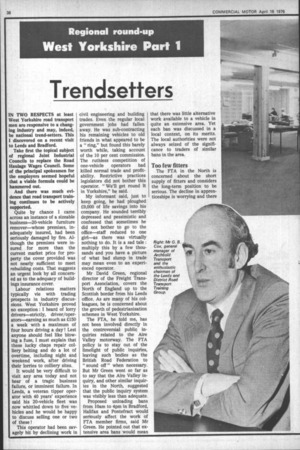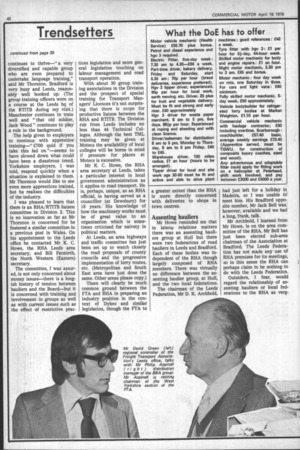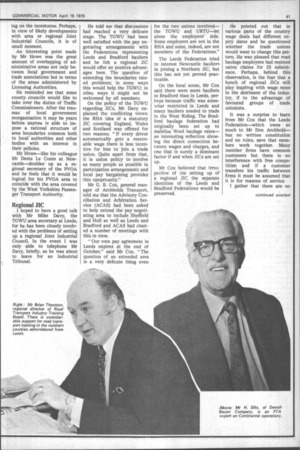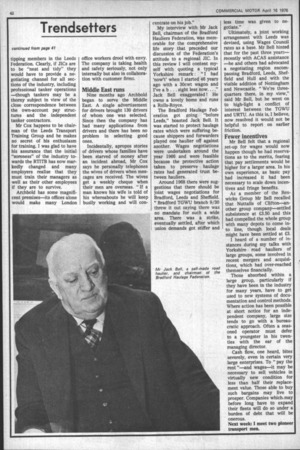Regional round-up
Page 40

Page 41

Page 42

Page 43

Page 44

If you've noticed an error in this article please click here to report it so we can fix it.
West Yorkshire Part 1
Trendsetters
IN TWO RESPECTS at least West Yorkshire road transport men are responsive to a changing industry and may, indeed, be national trend-setters. This I discovered on a recent visit to Leeds and Bradford.
Take first the topical subject of regional Joint Industrial Councils to replace the Road Haulage Wages Council. Some of the principal spokesmen for the employers seemed hopeful that a viable formula could be hammered out.
And there was much evidence that road transport training continues to be actively supported.
Quite by chance I came across an instance of a sizeable business-20-vehicle furniture remover—whose premises, inadequately insured, had been seriously damaged by fire. Although the premises were insured for more than the current market price for property the cover provided was not nearly sufficient to meet rebuilding costs. That suggests an urgent look by all concerned as to the adequacy of buildings insurance cover.
Labour relations matters typically vie with trading prospects in industry discussions. West Yorkshire proved no exception : I heard of lorry drivers—strictly, driver/operators—earning as much as £150 a week with a maximum of four hours driving a day ! Lest anyone should feel like blowing a fuse, I must explain that these lucky chaps repair colliery belting and do a lot of overtime, including night and weekend work, after driving their lorries to colliery sites.
It would be very difficult to visit any area today and not hear of a tragic business failure, or imminent failure. In Leeds, a veteran tipper operator with 40 years' experience said his 20-vehicle fleet was now whittled down to five vehicles and he would be happy to discuss selling one or two of these !
This operator had been savagely hit by declining work in civil engineering and building trades. Even the regular local government jobs had fallen away. He was sub-contracting his remaining vehicles to old friends in what appeared to be a "ring," but found this barely worth while, taking account of the 10 per cent commission. The ruthless competition of one-vehicle operators had killed normal trade and profitability. Restrictive practices legislators did not bother this operator. "We'll get round it in Yorkshire," he said.
My informant said, just to keep going, he had ploughed £9,000 of life savings into his company. He sounded terribly depressed and pessimistic and confessed that sometimes he did not bother to go to the office—staff reduced to one girl—as there was virtually nothing to do. It is a sad tale : multiply this by a few thousands and you have a picture of what bad slump in trade may mean even to an experienced operator.
Mr David Green, regional director of the Freight Transport Association, covers the North of England up to the Scottish border from his Leeds office. As are many of his colleagues, he is concerned about the growth of pedestrianisation schemes in West Yorkshire.
The FTA, he told me, has not been involved directly in the controversial public inquiries related to the Aire Valley motorway. The FTA policy is to stay out of the limelight of public inquiries, leaving such bodies as the British Road Federation to "sound off" when necessary. But Mr Green went so far as to say that the Aire Valley inquiry, and other similar inquiries in the North, suggested that the public inquiry system was visibly less than adequate.
Proposed unloading bans from 10am to 4pm in Bradford, Halifax and Pontefract would seriously affect the work of FTA member firms, said Mr Green. He pointed out that extensive area bans would mean that there was little alternative work available to a vehicle in quite an extensive area. Yet each ban was discussed in a local context, on its merits. The local authorities were not always seized of the significance to traders of similar bans in the area.
Too few fitters
The FTA in the North is concerned about the short supply of fitters and considers the long-term position to be serious. The decline in apprenticeships is worrying and there is a trend for good fitters to transfer to higher-paid driving jobs. With fitters rates in the £45 to £60 band there are still driving jobs paying a lot more. I heard of one case of four good diesel fitters transferring overnight to local authority work where wages are sometimes—can anyone be surprised ?—better than in road haulage or own-account work. I took the opportunity in a Leeds suburb of visiting one of the new Job Centres of the Department of Employment. (See What the DoE has to offer.) I called on Mr Brian Thornton, the RTITB regional dir ector, whose area covers Yorkshire, Lancashire, Cheshire and parts of North Wales. The area is well served by a complex of motorways. He told me that there had been a substantial response in applications for exemption; about 1,200 firms applied for exemption from levy payments last year out of about 25,000 levy payers. Some successful applicants were small firms.
Mr Thornton is, I think, rightly proud of the amount of training undertaken in his area. Some Group Training establishments are still fully booked up. Hull's training group continues to thrive—" a very diversified and capable group who are even prepared to undertake language training," said Mr Thornton. Bradford is very busy and Leeds, reasonably well booked up. (The group training officers were on a course at the Leeds hq of the RTITB during my visit.) Manchester continues to train well and "that old soldier, Jack Wood" continues to play a role in the background.
The help given to employers to continue with apprentice training—" £700 quid if you take this lad on "—seems to have slowed down what could have been a disastrous trend. Yorkshire employers, I was told, respond quickly when a situation is explained to them. Mr Thornton would like to see even more apprentices trained, but he realises the difficulties of the industry.
I was pleased to learn that there is an RHA/RTITB liaison committee in Division 2. This is no innovation so far as Mr Thornton is concerned for he fostered a similar committee in a previous post in Wales. On his appointment to the Leeds office he contacted Mr K. C. Howe, the RHA Leeds area secretary, and Bill Farnorth, the North Western (Eastern) secretary.
The committee, I was assured, is not only concerned about money issues—there is a longish history of tension between hauliers and the Board—but it is concerned with training and involvement in groups as well as with current issues such as the effect of restrictive prac tices legislation and more general legislation touching on labour management and road transport operation.
With about 30 group training associations in the Division and the prospect of special training for Transport Managers' Licences it's not surprising that there is scope for productive liaison between the RHA and RTITB. The Division run from Leeds includes no less than 44 Technical Colleges. Although the best TML training may be given at Motecs the availability of local colleges will be borne in mind if pressure for places at Motecs is excessive.
Mr K. C. Howe, the RHA area secretary at Leeds, takes a particular interest in local government administration as it applies to road transport. He is, perhaps, unique, as an RHA official, in having served as a councillor (at Dewsbury) for 18 years. His knowledge of how the machinery works must be of great value to an organisation which is sometimes criticised for naivety in political matters.
At Leeds, an area highways and traffic committee has just been set up to watch closely the road proposals of county councils and the progressive implementation of lorry routes, etc, (Metropolitan and South East area have just done the same. Other areas please copy.) There will clearly be much common ground between the FTA and RHA in preparing an industry position in the context of Dykes and similar legislation, though the FTA to a greater extent than the RHA is more directly concerned with deliveries to shops in town centres.
Assenting hauliers
Mr Howe reminded me that in labour relations matters there was an assenting hauliers group at Hull but there were two federations of road hauliers in Leeds and Bradford. Each of these bodies was independent of the RHA though largely composed of RHA members. There was virtually no difference between the assenting haulier group, at Hull, and the two local federations.
The chairman of the Leeds Federation, Mr D. K. Archbold, had just left for a holiday in Madeira, so I was unable to meet him. His Bradford opposite number, Mr Jack Bell was, however, available and we had a long, frank, talk.
Mr Archbold, I learned from Mr Howe, is on the area committee of the RHA. Mr Bell has just been elected sub-area chairman of the Association at Bradford. The Leeds Federation has not made any use of RHA premises for its meetings, so in this sense the RHA can perhaps claim to be nothing to do with the Leeds Federation.
Outsiders, I fear, would regard the relationship of assenting hauliers or local federations to the RHA as verg ing on the incestuous. Perhaps, in view of likely developments with area or regional Joint Industrial Councils, it is of small moment.
An interesting point made by Mr Howe was the great amount of overlapping of administrative areas not only between local government and trade associations but in terms of the areas administered by Licensing Authorities.
He reminded me that some county councils would like to take over the duties of Traffic Commissioners. After the traumas of local government reorganisation it may be years before anyone is able to impose a rational structure of area boundaries common both to local authorities and other bodies with an interest in their policies.
Mr Howe—like his colleague Mr Denis Le Conte at Newcastle—doubles up as a regional secretary of the PVOA and he feels that it would be logical for his PVOA area to coincide with the area covered by the West Yorkshire Passenger Transport Authority.
Regional JIC
I hoped to have a good talk with Mr Mike Davy, the TGWU area secretary at Leeds, for he has been closely involved with the problems of setting up a regional Joint Industrial Council. In the event I was only able to telephone Mr Davy, briefly, as he was about to leave for an Industrial Tribunal. He told me that discussions had reached a very delicate stage. The TGWU had been well satisfied with the pay negotiating arrangements with the Federations representing Leeds and Bradford hauliers and he felt a regional JIC would offer no positive advantages here. The question of extending the boundaries raised problems; in some ways this would help the TGWU; in other ways it might not be welcomed by all members.
On the policy of the TGWU regarding JICs, Mr Davy explained the conflicting views: the RHA idea of a statutory JIC covering England, Wales and Scotland was offered for two reasons. "If every driver automatically gets a reasonable wage there is less incentive for him to join a trade union. Quite apart from that, it is union policy to involve as many people as possible in participation arrangements and local pay bargaining provides this opoprtunity."
Mr G. B. Cox, general manager of Archbolds Transport, told me that the Advisory Conciliation and Arbitration Service (ACAS) had been asked to help extend the pay negotiating area to include Sheffield and Hull as well as Leeds and Bradford and ACAS had chaired a number of meetings with this in view.
"Our own pay agreement in Leeds expires at the end of October," said Mr Cox. "The question of an extended area is a very delicate thing even for the two unions involved— the TGWU and URTU—let alone the employers' side. Some employers are not in the RHA and some, indeed, are not members of the Federations."
The Leeds Federation tried to interest Newcastle hauliers in joining a Northern JIC, but this has not yet proved practicable.
On the local scene, Mr Cox said there were more hauliers in Bradford than in Leeds, perhaps because traffic was somewhat restricted in Leeds and many hauliers needed to trade in the West Riding. The Bradford haulage federation had originally been set up to stabilise Wool haulage rates— an interesting reflection showing the direct connection between wages and charges, and one that is surely a dominant factor if and when JICs are set up.
Mr Cox believed that irr.especitve of the setting up of a regional JIC the separate identities of the Leeds and Bradford Federations would be preserved. He pointed out that in various parts of the country wage deals had different expiry dates and he questioned whether the trade unions would want to change this pattern. He was pleased that road haulage employers had resisted union claims for £5 subsistence. Perhaps, behind this observation, is the fear that a bunch of regional JICs will play leapfrog with wage rates to the detriment of the industry, if to the advantage of favoured groups of trade unionists.
It was a surprise to learn from Mr Cox that the Leeds Federation—which owes so much to Mr Don Archbold— has no written constitution and no rules, save that members work together. Many member firms have common customers but there is no interference with free competition and if a customer transfers his traffic between firms it must be assumed that it is for reasons of service.
I gather that there are no tipping members in the Leeds Federation. Clearly, if JICs are to be "neat and tidy" they would have to provide a negotiating channel for all sections of the industry, including professional tanker operations —though tankers may be a thorny subject in view of the close correspondence between the own-account pay structures and the independent tanker contractors.
Mr Cox happens to be chairman of the Leeds Transport Training Group and he makes no secret of his enthusiasm for training. I was glad to have his assurance that the initial "soreness" of the industry towards the RTITB has now markedly changed and many employers realise that they must train their managers as well as their other employees if they are to survive.
Archbold has some magnificent premises—its offices alone would make many London office workers drool with envy. The company is taking health and safety seriously, not only internally but also in collaboration with customer firms.
Middle East runs
Nine months ago Archbold began to serve the Middle East. A single advertisement for drivers brought 130 drivers of whom one was selected. Since then the company has had many applications from drivers and there has been no problem in selecting good ones.
Incidentally, apropos stories of drivers whose families have been starved of money after an incident abroad, Mr Cox says he personally telephones the wives of drivers when messages are received. The wives get a weekly cheque when their men are overseas. "If a man knows his wife is told of his whereabouts he will keep busily working and will con centrate on his job."
My interview with Mr Jack Bell, chairman of the Bradford Hauliers Federation, was memorable for the comprehensive life story that preceded our discussion of the Federation's attitude to a regional JIC. In this review I will content myself with quoting a typical Yorkshire remark : "I had `nowT when I started 46 years ago with a 30cwt wagon and I've a b . sight less now...." Jack Bell exaggerated ! He owns a lovely home and runs a Rolls-Royce.
The Bradford Haulage Federation got going "before Leeds," boasted Jack Bell. It was started to protect haulage rates which were suffering because shippers and forwarders played one haulier off against another. Wages negotiations were undertaken around the year 1966 and were feasible because the protective action taken to preserve haulage rates had generated trust between hauliers.
Around 1968 there were suggestions that there should be joint wages negotiations for Bradford, Leeds and Sheffield. "Bradford TGWU branch 9/30 threw it out saying there was no mandate for such a wide area. There was a strike, eventually settled, after which union demands got stiffer and less time was given to negotiate."
Ultimately, a joint working arrangement with Leeds was devised, using Wages Council rates as a base. Mr Bell hinted that for the past three years— recently with ACAS assistance —he and others had advocated a negotiating region encompassing Bradford, Leeds, Sheffield and Hull and with the visible addition of Nottingham and Newcastle. "We're threequarters there, in my view," said Mr Bell, but he went on to high-light a conflict of interest between the TGWU and URTU. As this is, I believe, now resolved it would not be helpful to report on earlier friction.
Fewer incentives
Mr Bell felt that a regional set-up for wages would now happen though he had reservations as to the merits, fearing that pay settlements would be higher for a larger area. In his own experience, as basic pay had increased it had been necessary to scale down incentives and fringe benefits.
As a member of the Renwicks Group Mr Bell recalled that Nuttalls of Clifton—another group company—settled subsistence at £3.50 and this had compelled the whole group with many depots to come into line, though local deals might have been settled at £3.
I heard of a number of instances during my talks with Yorkshire road hauliers of large groups, some involved in recent mergers and acquisitions, which had over-reached themselves financially.
Those absorbed within a large group, particularly if they have been in the industry for many years, have to get used to new systems of documentation and control methods. Where action has been possible at short notice for an independent company, large size tends to go with a bureaucratic approach. Often a seasoned operator must defer to a youngster in his twenties with the ear of the managing director.
Cash flow, one heard, bites severely, even in certain very large enterprises. To "pay the rent "—and wages—it may be necessary to sell vehicles in virtually new condition for less than half their replacement value. Those able to buy such bargains may live to prosper. Companies which may before long have to expand their fleets will do so under a burden of debt that will be onerous.
Next week: 1 meet two pioneer transport men,




























































































